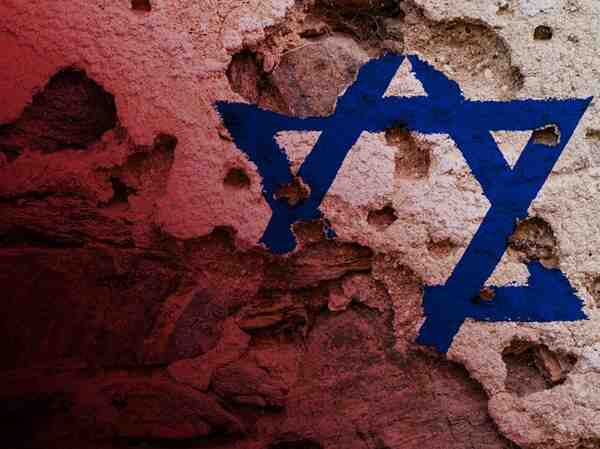
I’m at the Board meetings of our national Jewish Federations this weekend, with several of our lay leaders. We’re going to be sharing best practices, talking about combating hate, and how we’re allocating emergency funds for Israel and its people in this moment of need. So I’ll update you about that next week.
My awesome colleague Michal Zur reports that despite the overall low spirits now in Israel and to stand in solidarity and community, it was important for our partners on the ground that they too could take part in our Jewish Federation of Greater MetroWest Centennial Shabbat. So look at these awesome and inspiring photos.
The teens in our partner community Ofakim baked Challah for the newly settled evacuees from Kibbutz Sufa who just moved to Ofakim, until the Kibbutz (which suffered severe losses on October 7th) will be ready for their return. The women of the Isha Center baked and so did our Rishon Letzion Diller Teen Fellows. Arad Teen Leadership also baked and delivered the Challot to soldiers. Speaking of Centennial Shabbat, thank you so much to all of the dozens and dozens of synagogues and agencies who hosted amazing events across the community to celebrate 100 years of our Jewish Federation. On a personal note, I want to thank Rabbi Rubin and Temple Beth Ahm Yisrael for hosting me Erev Shabbat, and to Rabbi Tobin and B’nai Shalom for their hospitality Shabbat morning.
I got a powerful update from our Federation partner ITC yesterday, which focused on trauma work on the ground in Israel. Among many other areas, this struck me: the Ministry of the Interior approached Federation partner ITC to conduct resilience training with imams, Islamic religious and spiritual leaders, who hold a significant influence within Arab society. A total of 12 workshops are scheduled to take place nationwide, with the primary language of instruction being Arabic. These workshops will encompass a range of topics, including effective communication and interpersonal dialogue, emotional-first aid skills, and techniques for self-care. The aim is to engage and instruct a total of 240 imams, providing them with valuable tools and knowledge to enhance their roles as community leaders particularly in times of crisis.
Since the outbreak of the war, another Federation-supported program, Sela, has been helping new immigrants affected by the war. The challenges following a tragedy are especially difficult for immigrants. The lack of natural support systems of family and life-long friends limited or no financial safety nets, and a sense of uprootedness and isolation all exacerbate their already dire circumstances. Since October 7th Selah has been working around the clock comforting families who lost their beloved ones, visiting wounded people and their families in hospitals, purchasing food and necessities for families who were evacuated from the south to the center. Selah has been approached by immigrants from Ethiopia, Russia, Brazil, and English-speaking countries who are experiencing everything from general anxiety, evacuation from their homes to the murder or kidnapping of family members. Whatever they need, they’re there to embrace, a shoulder to lean on, to feel they’re not alone.
A couple of other things I’m looking at. First, this Newsweek op-ed by urban warfare expert Major John Spencer, “Israel Implemented More Measures to Prevent Civilian Casualties Than Any Other Nation in History.” And a new update that provides insight into Federations’ emergency allocations to Israel’s LGBTQ community since October 7. If you’re interested in volunteering in Israel check out this updated Jewish Federations’ update on the latest volunteering opportunities in Israel.
Oh. One more thing. I was asked the other day about rocket attacks (a war crime) and what the background is. So here, from a briefing I received the other day, is a good overview. Hamas launched the first rocket attacks from Gaza in 2002. Since then, Hamas and other Palestinian terrorist groups have been launching rockets and other projectiles from the Gaza strip as a means of imposing physical and emotional terror on the people of Israel. The number of rocket attacks on Israel has significantly decreased over the past few weeks as a result of the IDF’s counter-terror operation against Hamas. In the last two weeks, they have averaged just one or two per day. The only reason the devastation from the rockets is not far worse is thanks to the critical investment in the Iron Dome defense system.
Here’s the background. Since 2022, the intensity of fire from Gaza has increased with the most affected target being the town of Sderot, whose border is located under one mile from the Gaza Strip. Over the years, the rockets became more sophisticated with capabilities of reaching much deeper into Israel. Before October 7, 2023, approximately 20,000 rockets were launched into Israel from Gaza. Since October 7 over 12,000 rockets have been fired into Israel from Gaza. The attacks have directly killed 15 people and injured hundreds more. Attacks have been launched from civilian infrastructure, including safe zones the IDF set up for humanitarian purposes.
The constant rocket fire has had devastating mental health effects on Israelis, especially residents of southern communities. The Sderot Foundation has reported that 90% of the city’s residents suffer from PTSD, including 70 percent of the city’s children. The scope of the October 7th attacks and the resulting war have been linked to a nationwide massive increase in PTSD and other emotional disorders including depression and anxiety. The IDF has identified that between 10-20% of rockets launched from Gaza misfire, causing harm and sometimes death to Palestinians, such as the case of a failed rocket that hit a Palestinian hospital complex early in the war – an event that media initially blamed widely on Israel.
The indiscriminate launch of rockets at civilian cites renders each and every one a war crime, according to international law experts. Professor Arthur Van Coller said, “…Directing unguided rockets towards a densely populated urban area amounts to an unacceptable level of recklessness and risk to the civilian population…The use of Qassam rockets implicates the customary international law prohibition against indiscriminate attacks.” Since its development, Iron Dome, as well as other missile and rocket defense systems, have been critical to Israel’s defense. The IDF has stated that the Iron Dome has a remarkable over 90% success rate and has shot down thousands of rockets fired indiscriminately at civilian populations. A complete battery costs approximately $100 million to produce, and each interceptor costs approximately $50,000.
On October 20, the Biden Administration sent a supplemental funding request to Congress featuring $14.3 billion in emergency assistance to Israel. Jewish Federations support passing emergency funding for Israel as quickly as possible. This week, 400 Federation leaders met with dozens of Members of Congress on Capitol Hill, urging them to hasten the swift passage of this critical lifesaving aid. I’m proud of our response, and of our leadership. And I hope that you are too.
Shavua tov, a good week ahead for us all.

